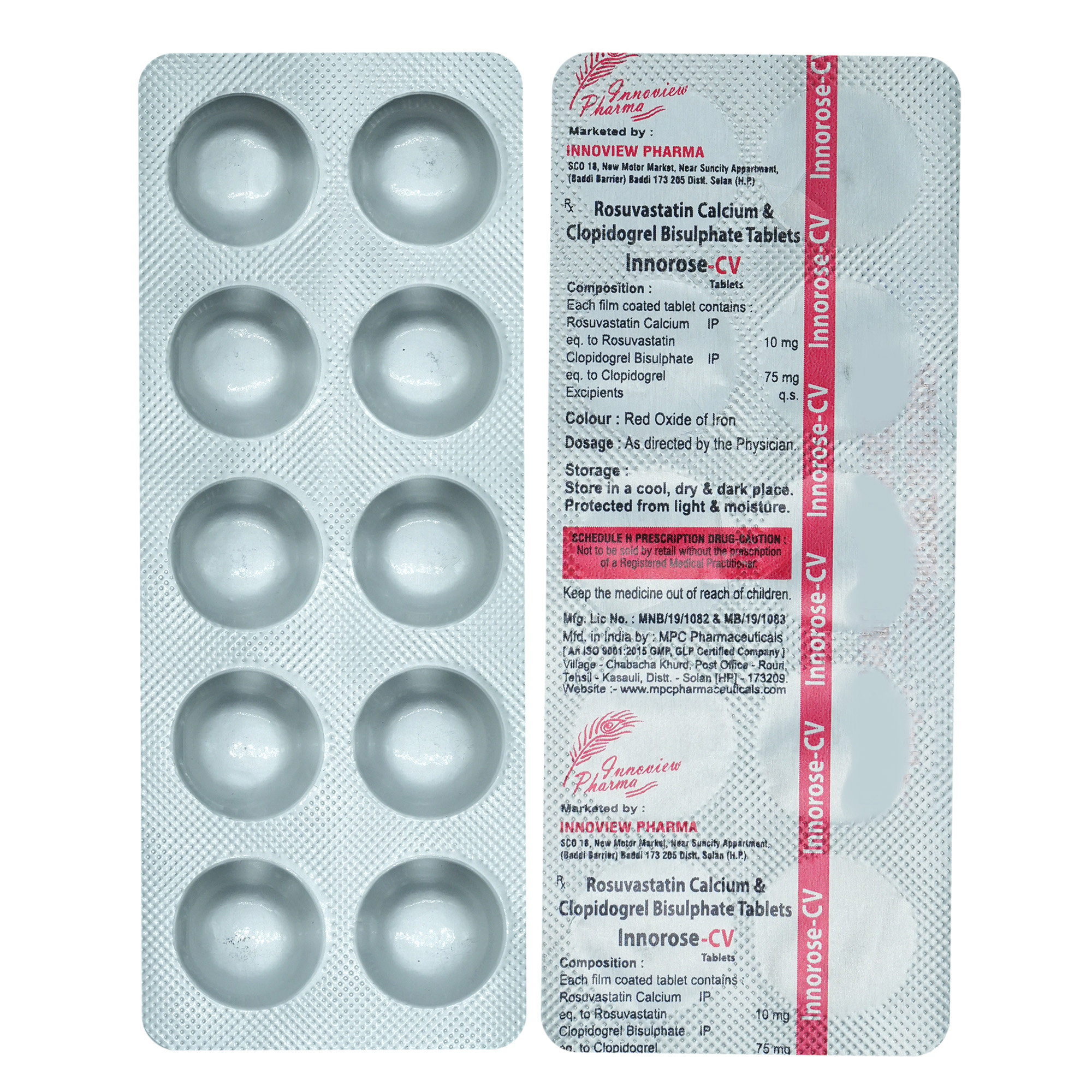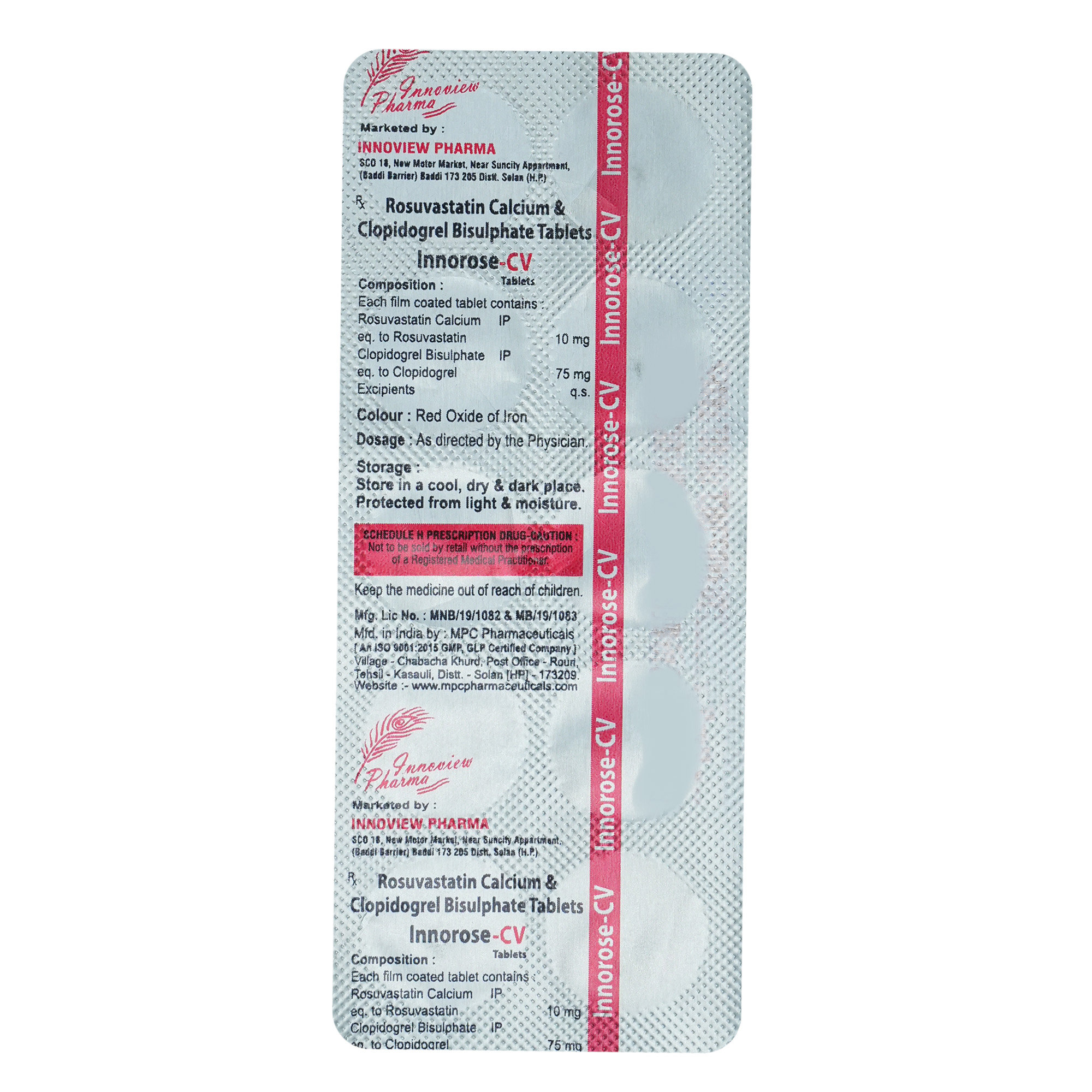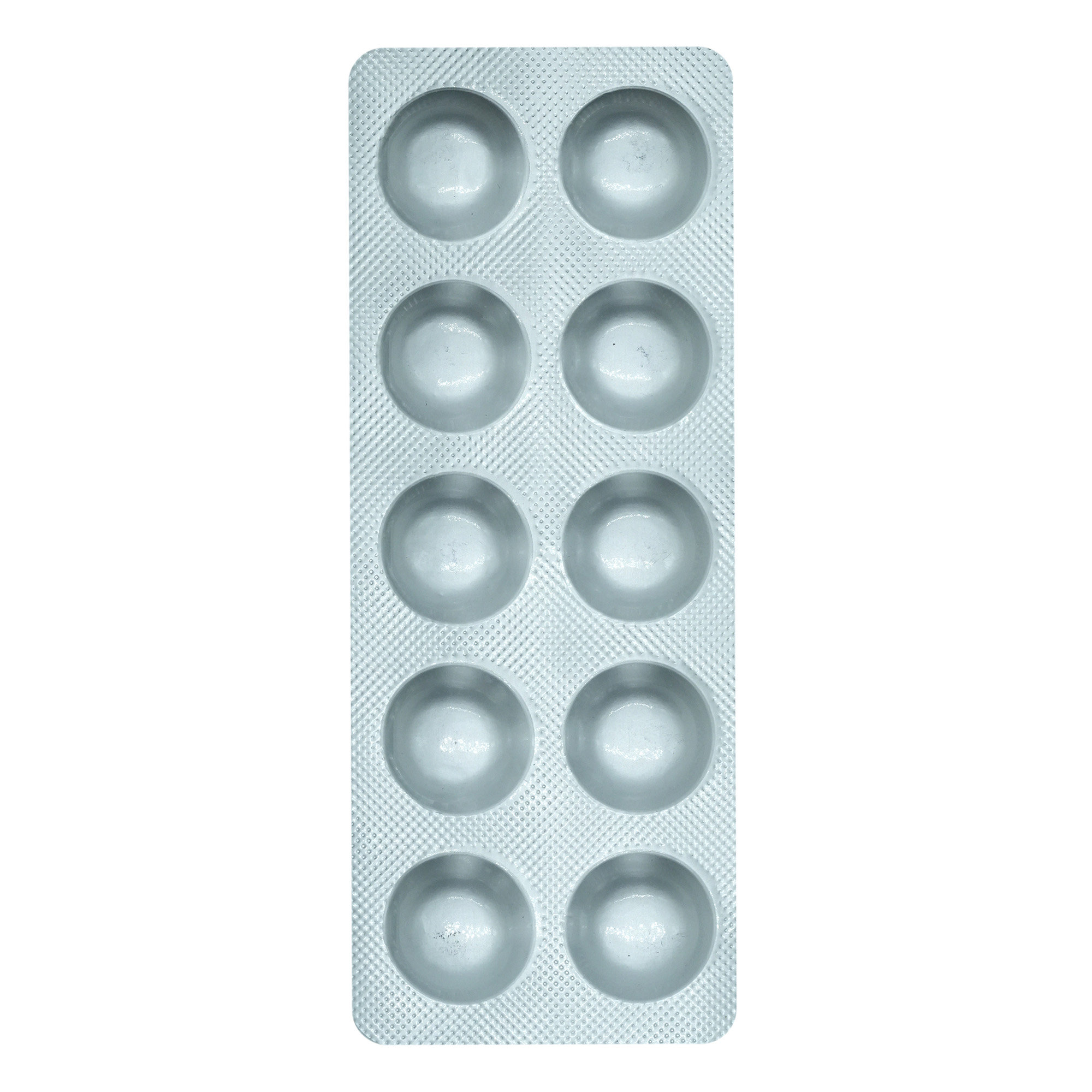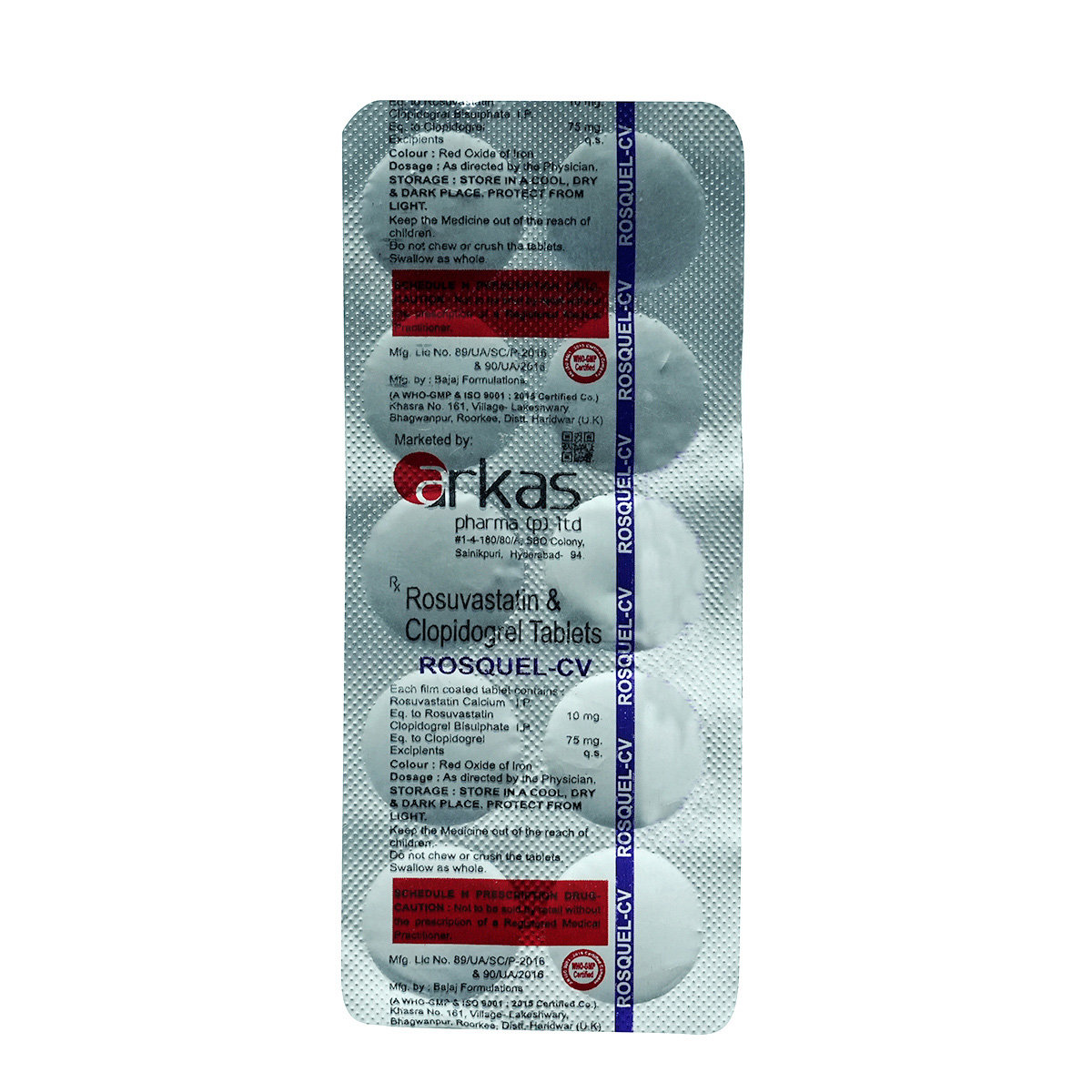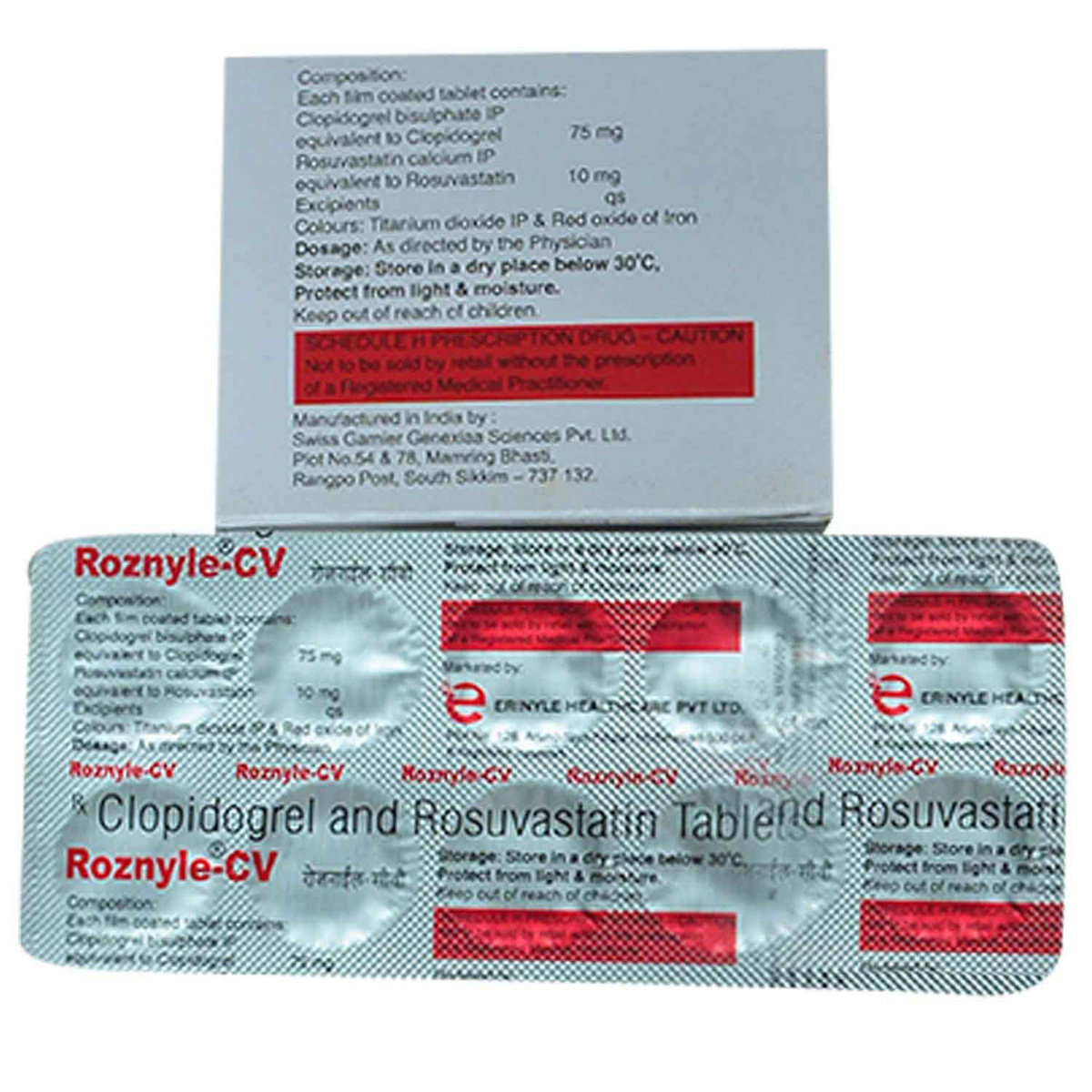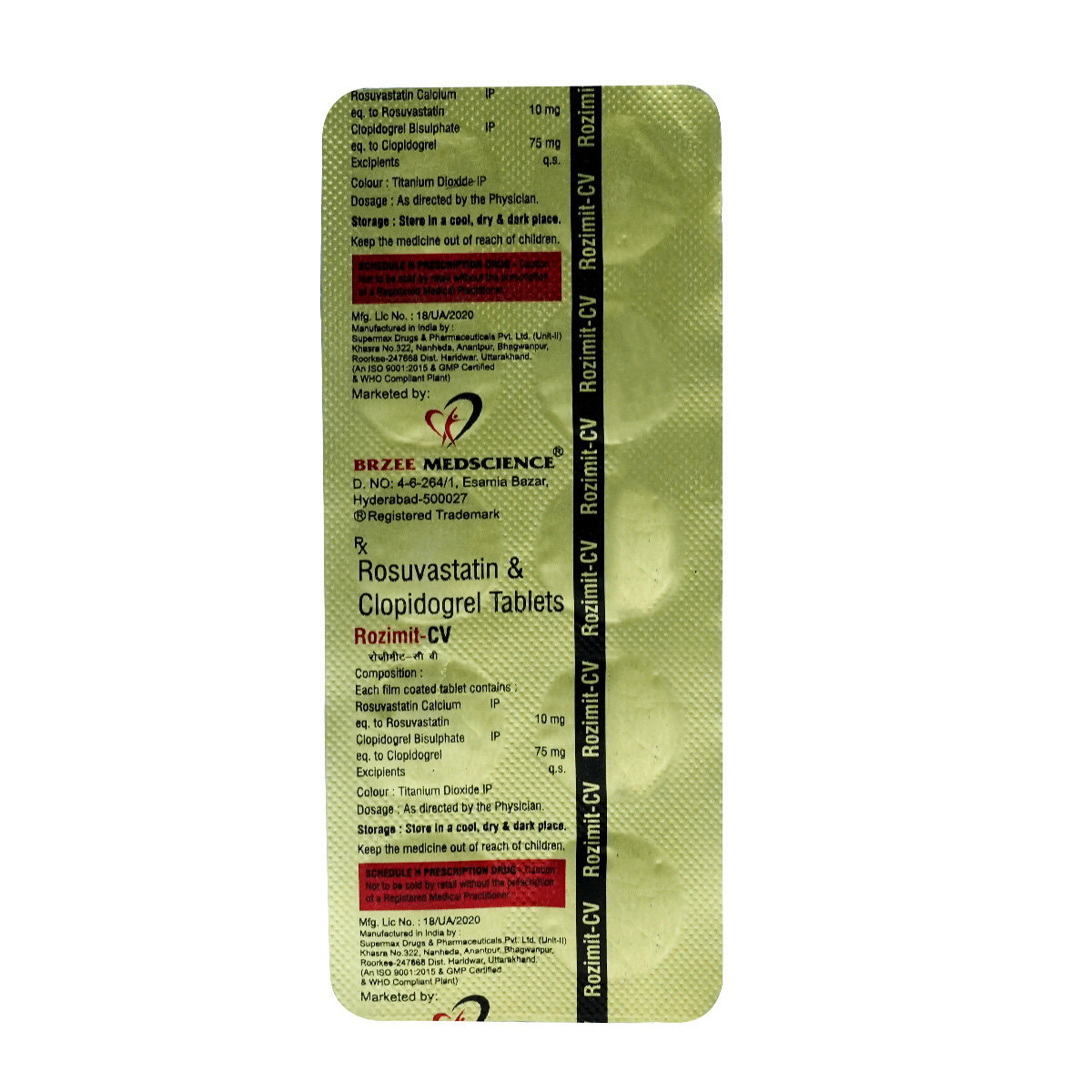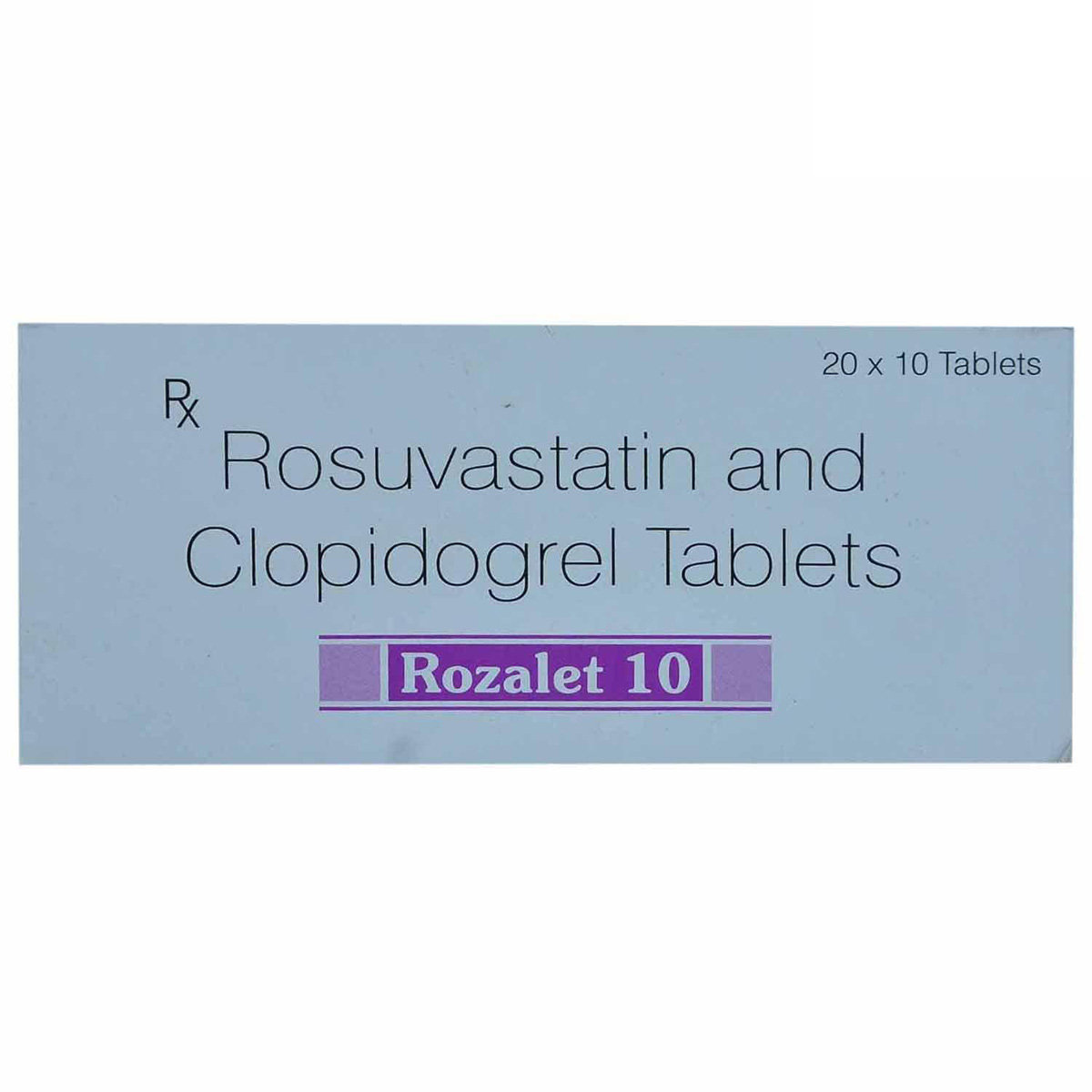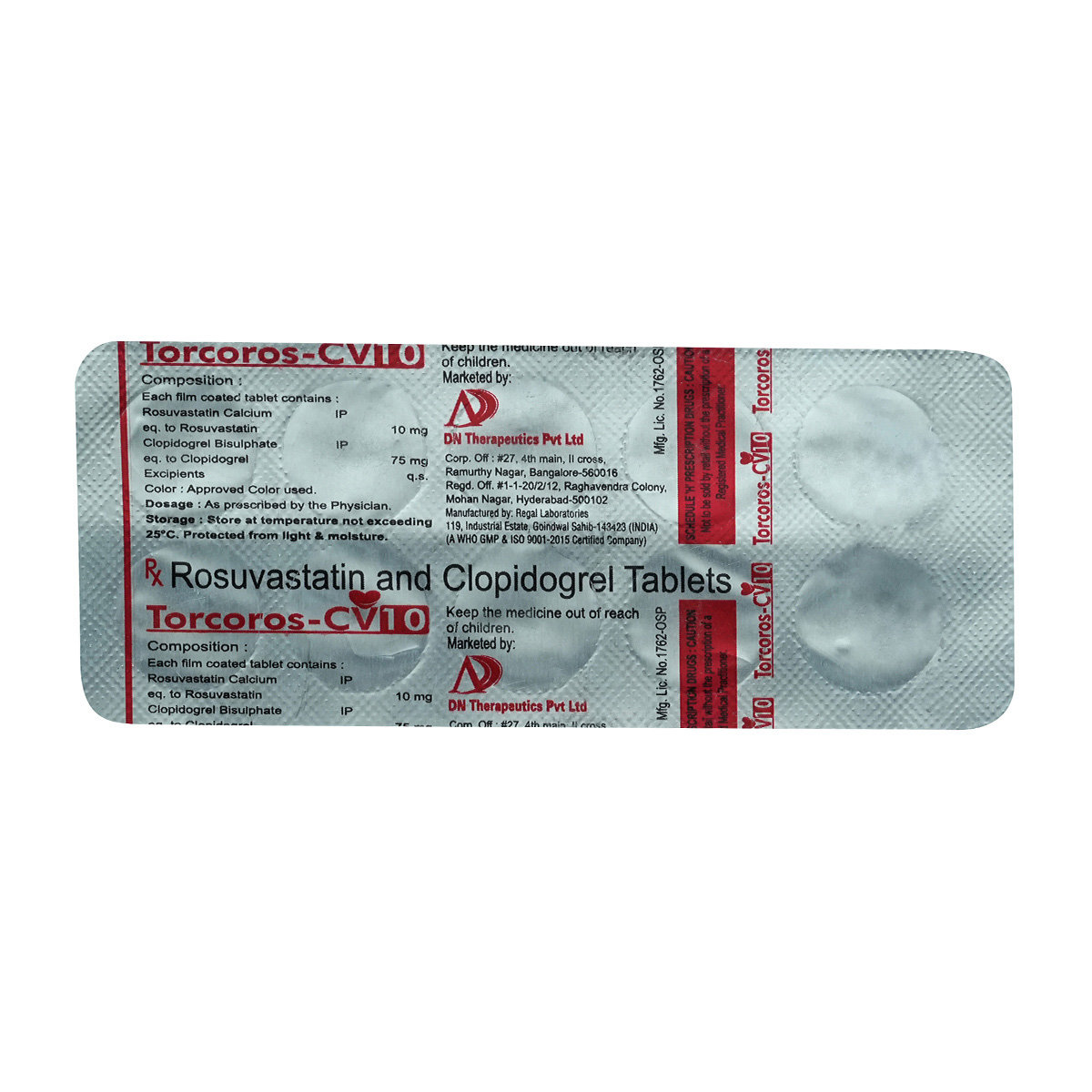Innorose-CV 10/75 Tablet 10's
MRP ₹164
(Inclusive of all Taxes)
₹24.6 Cashback (15%)
Provide Delivery Location
Online payment accepted
 Prescription drug
Prescription drugWhats That
Composition :
Manufacturer/Marketer :
Consume Type :
Expires on or after :
Return Policy :
About Innorose-CV 10/75 Tablet
Innorose-CV 10/75 Tablet is a combination drug composed of a blood-thinning agent and cholesterol-lowering agent, primarily used to prevent heart attack and stroke in the future. It lowers the raised level of cholesterol and fats (triglycerides) in our body. A heart attack is a condition in which your coronary arteries (blood vessel supplying blood and oxygen to the heart) becomes blocked due to build-up of fats (plaque) including cholesterol. These plaques narrow the arteries, leading to atherosclerosis and coronary artery disease, mainly for most heart attacks.
Innorose-CV 10/75 Tablet is composed of two medicines, namely: Rosuvastatin and Clopidogrel. Rosuvastatin is a lipid-lowering medication that blocks the enzyme required to make cholesterol in the body. As a result, it lowers the bad cholesterol (low-density lipoproteins or LDL), triglycerides (TG) and increases the levels of good cholesterol (high-density lipoproteins or HDL). Clopidogrel is a blood thinner (anticoagulant) that collectively prevents a clot in the blood vessels. Together Innorose-CV 10/75 Tablet reduces the increased levels of bad cholesterol (low-density lipoprotein and triglycerides) and prevents blood clots, thereby reducing and preventing the risk of heart attack, stroke and heart-related chest pain (angina).
Take Innorose-CV 10/75 Tablet exactly as directed by your doctor. The dose and duration of Innorose-CV 10/75 Tablet may differ depending on the reason why you're taking it and your responses to treatment. In some cases, you may experience headaches, ankle swelling due to fluid retention (oedema), slow heart rate, and nausea. Innorose-CV 10/75 Tablet is known to cause dizziness, so driving should be avoided. Most of these side effects of Innorose-CV 10/75 Tablet do not require medical attention and gradually resolve over time. However, if the side effects are persistent, reach out to your doctor.
Try not to stop taking Innorose-CV 10/75 Tablet of your own. Suddenly stopping Innorose-CV 10/75 Tablet may worsen your condition and increase your risk of a future heart attack. Inform your doctor know if you are allergic to rosuvastatin, clopidogrel, or have any active liver disease (liver enzymes abnormalities), active bleeding issues (like peptic ulcer, brain haemorrhage), or muscle problem (myopathy, rhabdomyolysis). The patient should inform the doctor that they are taking Innorose-CV 10/75 Tablet before any surgery is scheduled or any new medicine is taken. Rosuvastatin present in Innorose-CV 10/75 Tablet is a pregnancy category X drug, so it should not be given to pregnant women. It may cause harm to the fetus if administered to pregnant or breastfeeding women.
Uses of Innorose-CV 10/75 Tablet
Directions for Use
Key Benefits
Rosuvastatin is a lipid-lowering medication that blocks the enzyme required to make cholesterol in the body. As a result, it lowers the bad cholesterol (low-density lipoproteins or LDL), triglycerides (TG) and increases the levels of good cholesterol (high-density lipoproteins or HDL). Clopidogrel is a blood thinner (anticoagulant) that collectively prevents a clot in the blood vessels. Together Innorose-CV 10/75 Tablet reduces the increased levels of bad cholesterol (low-density lipoprotein and triglycerides) and prevents blood clots, thereby reducing the risk of heart attack, stroke, and heart-related chest pain (angina).
Storage
- Inform your doctor about the common cold symptoms you're experiencing due to medication.
- Your doctor may adjust your treatment plan, which could include changing your medication, adding new medications, or offering advice on managing your symptoms.
- Practice good hygiene, including frequent handwashing, avoiding close contact with others, and avoiding sharing utensils or personal items.
- Drink plenty of fluids, such as warm water or soup, to help thin out mucus.
- Get plenty of rest and engage in stress-reducing activities to help your body recover. If your symptoms don't subside or worsen, consult your doctor for further guidance.
- Drink water or other clear fluids.
- To prevent worsening of pain, limit intake of tea, coffee, or alcohol.
- Include bland foods like rice, toast, crackers, and rice in your diet.
- Avoid lying down immediately after eating as it may cause indigestion or heartburn.
- Avoid acidic and spicy food as it may cause indigestion.
- Take medications with food (if recommended): It can help prevent stomach distress and indigestion.
- Eat smaller, more frequent meals: Divide daily food intake into smaller, more frequent meals to ease digestion.
- Avoid trigger foods: Identify and avoid foods that trigger indigestion, such as spicy, fatty, or acidic foods.
- Stay upright after eating: Sit or stand upright for at least 1-2 hours after eating to prevent stomach acid from flowing into the oesophagus.
- Avoid carbonated drinks: Avoid drinking carbonated beverages, such as soda or beer, which can worsen indigestion.
- Manage stress: To alleviate indigestion, engage in stress-reducing activities like deep breathing exercises or meditation.
- Consult a doctor if needed: If indigestion worsens or persists, consult a healthcare professional to adjust the medication regimen or explore alternative treatments.
- Inform Your Doctor: Notify your doctor immediately about your diarrhoea symptoms. This allows them to adjust your medication or provide guidance on managing side effects.
- Stay Hydrated: Drink plenty of fluids to replace lost water and electrolytes. Choose water, clear broth, and electrolyte-rich drinks. Avoid carbonated or caffeinated beverages to effectively rehydrate your body.
- Follow a Bland Diet: Eat easy-to-digest foods to help firm up your stool and settle your stomach. Try incorporating bananas, rice, applesauce, toast, plain crackers, and boiled vegetables into your diet.
- Avoid Trigger Foods: Steer clear of foods that can worsen diarrhoea, such as spicy, fatty, or greasy foods, high-fibre foods, and dairy products (especially if you're lactose intolerant).
- Practice Good Hygiene: Maintain good hygiene to prevent the spread of infection. To stay healthy, wash your hands frequently, clean and disinfect surfaces regularly, and avoid exchanging personal belongings with others.
- Take Anti-Diarrheal Medications: If your doctor advises, anti-diarrheal medications such as loperamide might help manage diarrhoea symptoms. Always follow your doctor's directions.
- Keep track of your diarrhoea symptoms. If they don't get better or worse or are accompanied by severe stomach pain, blood, or dehydration signs (like extreme thirst or dark urine), seek medical help.
- Inform your doctor about the nausea and discuss possible alternatives to the medication or adjustments to the dosage.
- Divide your daily food intake into smaller, more frequent meals to reduce nausea.
- Opt for bland, easily digestible foods like crackers, toast, plain rice, bananas, and applesauce.
- Avoid certain foods that can trigger nausea, such as fatty, greasy, spicy, and smelly foods.
- Drink plenty of fluids, such as water, clear broth, or electrolyte-rich beverages like coconut water or sports drinks.
- Use ginger (tea, ale, or candies) to help relieve nausea.
- Get adequate rest and also avoid strenuous activities that can worsen nausea.
- Talk to your doctor about taking anti-nausea medication if your nausea is severe.
- Record when your nausea occurs, what triggers it, and what provides relief to help you identify patterns and manage your symptoms more effectively.
Drug Warnings
Tell your doctor if you are allergic to rosuvastatin, clopidogrel, or any of its ingredients. If you have any active liver disease, active bleeding issues (like peptic ulcers, brain haemorrhage), pregnant, or plan to become pregnant or breastfeeding, do not take Innorose-CV 10/75 Tablet until prescribed. The patient should inform the doctor that they are taking Innorose-CV 10/75 Tablet before any surgery is scheduled or any new medicine is taken. Rosuvastatin present in Innorose-CV 10/75 Tablet is a pregnancy category X drug, so it is contraindicated in pregnant women. As it may cause harm to the fetus if administered to pregnant women. The risk of muscle problems might increase if Innorose-CV 10/75 Tablet is taken with an antibiotic (clarithromycin), anti-HIV drugs (ritonavir, lopinavir, darunavir, atazanavir, indinavir) and antifungal (itraconazole). Coadministration with anticoagulants like warfarin may cause gastric bleeding and other bleeding problems. So, if you are using any blood-thinning agents, let your doctor know about this. Innorose-CV 10/75 Tablet contains rosuvastatin, which can cause muscle problems like myopathy and rhabdomyolysis. Patients with active liver disease should use the Innorose-CV 10/75 Tablet with caution. Safety and effectiveness of Innorose-CV 10/75 Tablet have not been established, so its use should be avoided in paediatric patients less than ten years of age. Discontinuation of Innorose-CV 10/75 Tablet may lead to cardiovascular events like heart attack, stroke, and angina (heart-related chest pain). Hence, you should consult a doctor before stopping the dose of Innorose-CV 10/75 Tablet .
Drug-Drug Interactions
Drug-Drug Interactions
Login/Sign Up
Taking Innorose-CV 10/75 Tablet together with mifepristone increases the risk of vaginal bleeding in women.
How to manage the interaction:
Although taking Innorose-CV 10/75 Tablet with mifepristone is not recommended, that would certainly result in interaction, it can be taken if a doctor prescribes it. If you experience prolonged and heavy bleeding, consult a doctor immediately. Do not discontinue any medication without consulting a doctor.
When Selexipag and Innorose-CV 10/75 Tablet are taken together, the body's ability to break down Selexipag may be reduced.
How to manage the interaction:
Taking Innorose-CV 10/75 Tablet with Selexipag is not recommended, please consult your doctor before taking it. They can be taken if prescribed by your doctor.
Taking Innorose-CV 10/75 Tablet with Posaconazole can increase the blood levels of Innorose-CV 10/75 Tablet. This can increase the risk of side effects.
How to manage the interaction:
Although there is an interaction between posaconazole with Innorose-CV 10/75 Tablet, they can be taken together if advised by your doctor. However, contact the doctor if you experience unexplained muscle pain, weakness, fever, chills, joint pain or swelling, unusual bleeding, skin rash, itching, loss of appetite, fatigue, nausea, vomiting, dark coloured urine, or yellowing of the skin or eyes. Do not discontinue any medications without consulting a doctor.
Using desirudin together with Innorose-CV 10/75 Tablet may increase the risk of bleeding.
How to manage the interaction:
Taking Innorose-CV 10/75 Tablet with Desirudin together can result in an interaction, but it can be taken if your doctor has advised it. However, consult a doctor if you experience difficulty with bleeding, bleeding, bruising, feeling dizzy or lightheaded, dark or sticky stools, headache, or vomiting. Do not stop using any medications without a doctor's advice.
Taking loperamide with Innorose-CV 10/75 Tablet may significantly increase the blood levels of loperamide. This can lead to serious and complications such as irregular heart rhythm.
How to manage the interaction:
Although talking Innorose-CV 10/75 Tablet with loperamide may result in an interaction, it can be taken together if prescribed by a doctor. However, consult a doctor if you experience sudden dizziness, lightheadedness, or shortness of breath. Do not discontinue any medications without consulting a doctor.
Taking Innorose-CV 10/75 Tablet with acalabrutinib may increase the risk of bleeding.
How to manage the interaction:
There could be a possible interaction between Innorose-CV 10/75 Tablet and Acalabrutinib, but they can be taken together if your doctor has prescribed them. However, consult your doctor immediately if you experience any unusual bleeding or have other signs of bleeding, like feeling dizzy or lightheaded, red or black, sticky stools, or severe headaches. Do not discontinue any medication without consulting your doctor.
Taking rosuvastatin with Innorose-CV 10/75 Tablet can increase the blood levels of rosuvastatin. This can increase the risk of side effects.
How to manage the interaction:
Although taking Innorose-CV 10/75 Tablet together with Rosuvastatin may result in an interaction, it can be taken if prescribed by your doctor. However, consult your doctor immediately if you experience chills, joint pain or swelling, skin rash, itching, nausea, vomiting, dark-colored urine, and/or yellowing of the skin or eyes. Do not discontinue any medication without consulting your doctor.
Taking enoxaparin with Innorose-CV 10/75 Tablet can increase the risk of bleeding.
How to manage the interaction:
There may be a possibility of interaction between Innorose-CV 10/75 Tablet and Enoxaparin, but they can be taken together if prescribed by a doctor. However, If you experience any unusual bleeding or have other signs of bleeding like feeling dizzy or lightheaded, red or black, sticky stools, or headache, consult a doctor immediately. Do not discontinue any medication without consulting a doctor.
Taking Innorose-CV 10/75 Tablet with ticlopidine can reduced effectiveness of Innorose-CV 10/75 Tablet.
How to manage the interaction:
Taking Innorose-CV 10/75 Tablet and Ticlopidine together possibly has an interaction, but you can take these medications together if your doctor has advised it. Do not stop using any medications without talking to your doctor.
Taking Innorose-CV 10/75 Tablet with Dabigatran may increase the risk of bleeding.
How to manage the interaction:
Although there may be an interaction between Innorose-CV 10/75 Tablet and Apixaban, they can be taken together if advised by your doctor. However, consult your doctor immediately if you experience any unusual bleeding, dizziness or lightheadedness, red or black, sticky stools, or headaches. Do not discontinue any medication without consulting your doctor.
Drug-Food Interactions
Drug-Food Interactions
Login/Sign Up
Diet & Lifestyle Advise
- A low cholesterol diet and a regular exercise regime effectively complement treatment with Innorose-CV 10/75 Tablet .
- Stick to a freshly prepared home-cooked meal and avoid processed, packed foods that contain hidden sugar and extra calories.
- Try to replace most of your saturated fats with unsaturated fats to reduce total cholesterol and LDL cholesterol (bad cholesterol) quickly.
- Foods like avocados, olive oil, fatty fish, and nuts contain too many heart-healthy unsaturated fats, so eating them regularly is beneficial.
- Include a diet enriched in fats like fish oils, polyunsaturated oils, and omega-3 fatty acids, which are good for heart health.
- Quit smoking and avoid excessive intake of alcohol.
Side Effects of Innorose-CV 10/75 Tablet
- Stomach bleeding
- Gastrointestinal bleeding
- Nose bleeding
- Rash
- Diarrhoea
- Stomach ulcer
- Muscle disease (myopathy, rhabdomyolysis)
- Abdominal pain
Habit Forming
Therapeutic Class
All Substitutes & Brand Comparisons
RX
Rosuson-CV 10 Tablet 10's
Unison Pharmaceuticals Pvt Ltd
₹56
(₹5.04 per unit)
65% CHEAPERRX
Rosubeat CV 10 Tablet 10's
Zenolia Life Science Pvt Ltd
₹112.5
(₹10.13 per unit)
31% CHEAPERRX
Rosquel-CV Tablet 10's
Arkas Pharma Pvt Ltd
₹135
(₹12.15 per unit)
17% CHEAPER
Drug-Diseases Interactions
Drug-Diseases Interactions
Login/Sign Up
FAQs
Drug-Drug Interactions Checker List
- ERYTHROMYCIN
- CLARITHROMYCIN
- RITONAVIR
- LOPINAVIR
- DARUNAVIR
- ATAZANAVIR
- INDINAVIR
- ITRACONAZOLE
- WARFARIN
- HEPARIN
- COLCHICINE
- DIGOXIN
- CYCLOSPORINE
Disease/Condition Glossary
Heart attack: Heart attack is when your coronary arteries (blood vessels supplying blood and oxygen to the heart) become blocked due to the build-up of fats (plaque), including cholesterol. These plaques narrow the arteries, leading to atherosclerosis and coronary artery disease, mainly for most heart attacks.
Stroke: Stroke occurs when the blood and oxygen supply to the brain is blocked or minimized. As a result, the brain tissue is deprived of getting oxygen and nutrients. After a few minutes, brain cells (neurons) start to die. A stroke is a medical emergency; immediate treatment is required; else can cause brain damage, coma or even death.
Atherosclerosis: Atherosclerosis occurs when fats, cholesterol, and other substances known as plaque deposit on your artery walls that restrict blood flow. This plaque formation triggers blood clots, narrows the artery's size, and hardens it. This, in turn, can lead to various heart complications like atherosclerosis, heart attack, heart-related chest pain (angina), and stroke. However, it can also affect the body's arteries apart from the heart.

Have a query?
Alcohol
Safe if prescribed
Innorose-CV 10/75 Tablet should not be taken with alcohol as it may worsen your liver condition with increased secretion of liver enzymes like transaminase. Keep your doctor informed if you drink alcohol.
Pregnancy
Consult your doctor
Innorose-CV 10/75 Tablet contains Rosuvastatin, which is a pregnancy category X medicine. It may cause harm to both the pregnant mother and the fetus. Hence, it is not recommended for pregnant women and those who are planning for a pregnancy. Your doctor might prescribe you only in an extreme case.
Breast Feeding
Consult your doctor
Take Innorose-CV 10/75 Tablet only when prescribed, it is known to pass on in a limited quantity via breast milk to the child.
Driving
Safe if prescribed
Drive with caution, Innorose-CV 10/75 Tablet usually causes blurry vision and may affect driving ability.
Liver
Consult your doctor
Innorose-CV 10/75 Tablet to be taken with caution, especially if you have a history of liver diseases/conditions. The dose may have to be adjusted by your doctor.
Kidney
Consult your doctor
Innorose-CV 10/75 Tablet to be taken with caution, especially if you have a history of kidney diseases/conditions. The dose may have to be adjusted by your doctor.
Children
Safe if prescribed
Innorose-CV 10/75 Tablet is not recommended for children below the age of 10 years. The safety and effectiveness of Innorose-CV 10/75 Tablet have not been established in children due to limited testing of Innorose-CV 10/75 Tablet on children by competent authorities worldwide.

